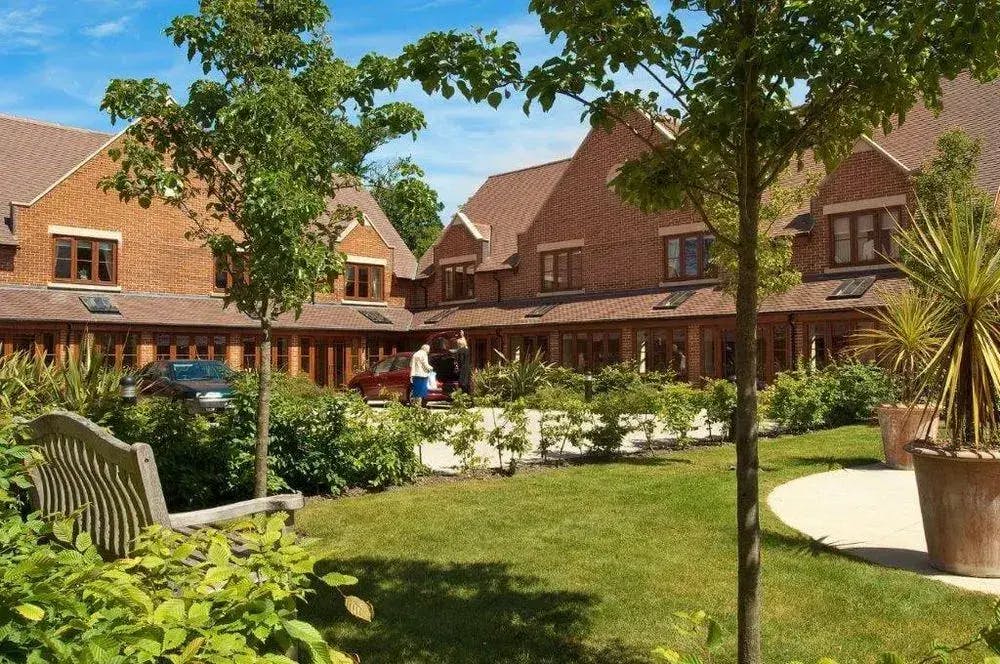What is a Care Home? Everything You Need to Know

Estimated Reading Time: 10 minutes
If your loved one requires additional care in safe and comfortable surroundings, a care home may be the best choice for them.
With this in mind, we’ve explained exactly what a care home is. We’ve also covered the different types, how to choose a care home, when to consider one, how much they cost, and what they're like to live in.
Kickstart your care search
Find the best care homes in your area through Lottie.
In this article:
- What is a care home?
- The different types of care homes
- What else do care homes offer?
- Care home costs
- When to consider a care home
- Moving into a care home
- Living in a care home
- Picking the right care home
What Is a Care Home?
A care home provides accommodation, personal care and help from trained care professionals for anyone who needs additional support in their daily lives, including older adults. Someone may need to move into a care home when they can no longer live independently in their own home.
The care offered, the type of care - personal, nursing or dementia - and size vary from home to home.
A care home should feel like a home away from home, with various engaging social activities and impressive facilities, such as on-site cafés and wellness spas. These activities and facilities can also help to reduce loneliness and feelings of isolation. Moreover, supportive companionship is often available for anyone who needs it.

The Different Types of Care Homes
Residential care homes
A residential care home focuses on providing its residents compassionate and respectful personal care. This includes support with things like:
- Getting dressed and undressed
- Using the toilet
- Personal hygiene tasks such as washing and bathing
- Oral hygiene
- Administering medication and medication management
Residential care is the most common type of care provided within a care home. The residential care required will differ from person to person. Some will only need - and want - a little support, while others will benefit from round-the-clock care.
Your loved one’s needs will be set out within a personalised care plan.
Nursing homes
Nursing homes differ slightly from other homes as they have registered and qualified nurses to provide specific medical support beyond personal care like washing, dressing and helping residents in and out of bed. Many residents who live in a nursing home will receive 24/7, round-the-clock support from qualified nurses.
This includes people with severe physical or learning disabilities, people who require intensive rehabilitative care or individuals with other long-term conditions.
Nursing homes also offer care for people with cancer or terminal illnesses, helping them manage pain and supporting them emotionally through their treatment. This includes end-of-life care and palliative care.
There will always be at least one qualified nurse on duty to provide support in a nursing home.

Dementia care homes
If your loved one is living with dementia, it might be appropriate for them to live in a dementia care home which offers specialist dementia care. Here, expert carers will use expert techniques to provide compassionate and knowledgeable support, often around the clock.
Some dementia care homes will have a secure unit as well, to ensure the safety of residents living with advanced dementia who are prone to wandering. Security is created through features such as keypad entrances and carefully designed layouts to avoid confusion for residents.
Some of the most common types of treatment used in a dementia care home include reminiscence therapy - looking at old photos and other memories with elderly residents - music and art therapy, sensory stimulation and even aromatherapy.
These activities tap into the senses of dementia residents, prompt conversations and evoke the emotions associated with these happy memories. Dementia care homes may include specialist equipment like sensory tables. They might also have a sensory garden to further aid those with dementia.
Dementia residents are usually allowed to bring furniture from home to make their bedrooms more familiar and easier to settle into. Residents and their loved ones are often encouraged to create memory boxes filled with sentimental items and old photographs.
Respite care homes
A respite care home provides short-term support for residents, often for a few weeks while their main carer takes a well-earned break. Our 2024 Care Seeker Survey shows that older adults often use temporary respite care as a way of transitioning into permanent care.
The care offered will vary from home to home but could include the types of care listed above, such as residential, nursing and dementia care.

What Else Do Care Homes Offer?
Along with care to meet your loved one’s needs, care homes offer a range of amazing facilities, activities and experiences, delicious meals served throughout the day, supportive staff and a friendly environment to help you or your loved one feel at ease.
To ease your search, our detailed care home listings include everything a home has to offer its residents, such as the facilities and activities available, whether bedrooms have en-suite facilities, how many beds the home contains, whether bills are all-inclusive and how close the home is to useful amenities like a bus stop, train station and nearby shops.
Care Home Costs
Our internal data shows that the average weekly cost of living in a UK residential care home is £1,406. The average nursing home cost is £1,558 per week. Every month, residential care costs an average of £6,093, which includes support with washing, dressing and eating, while nursing care costs £6,751 per month.
We have an article explaining care home costs throughout the UK, including how they differ depending on the type of care required.
Who pays for care in a care home?
Whether you pay for care in a care home depends on the total value of your income, savings and assets. This total value will be determined through a financial assessment from your local council.
A financial assessment is free and immediately follows a care needs assessment. You can arrange a care needs assessment by social services here.
If you have over £23,250 in England or Northern Ireland, £35,000 in Scotland or £50,000 in Wales, you’ll be required to pay your own care home fees. If you have less than this amount, you’ll be eligible for partial or full support with care home fees from your local authority.
When to Consider a Care Home
A care home may be the best option if you or your loved one can no longer live independently, if care needs have changed or if other family members are finding it tough to provide the necessary personal care and support.
Some older adults reach a point in their lives where they become at risk of injury, require regular medication and develop conditions such as dementia. At this point, a care home should be considered.
A care needs assessment can determine whether or not a care home is the best choice for you or a loved one.

Moving into a Care Home
First, a decision indicates that a person can no longer live independently in their own home. This is either a personal decision or advice from the council, a doctor or another medical professional.
Once you’ve found the perfect home, take the following steps to make the move-in process much smoother:
- Make sure your new care home is fully aware of your or your loved one’s personal circumstances, such as any physical disabilities (this will have likely already been discussed)
- Update your address where needed, along with letting family and friends know of your new address
- If you receive any benefits, you should contact the relevant benefits office, as these could be affected by your stay in a care home
If your loved one is moving into a care home, be sure to provide them with whatever support they need, including assistance on the moving day itself. You should then regularly check in to see how they’re finding the settling-in process.
Living in a Care Home
From regular social activities and day trips out to round-the-clock support whenever needed, living in a care home is an excellent choice in later life. Residents are given cosy, furnished or unfurnished rooms, depending on their preference. En-suite bathrooms and personal seating areas for relaxation are also common.
Meals, housekeeping and laundry services are provided, with many care homes even providing on-site facilities such as hair and beauty salons, bistro-style restaurants, cafés, bars, shops, libraries and gardens.

Care homes encourage their residents to keep busy through numerous social activities. These range from arts and crafts to music, dancing, exercise classes and visits from respected speakers and entertainers! An activities coordinator will organise all of these activities.
Some will provide a minibus service - you can think of this as a privately chauffeured limo - to take residents on day trips and excursions to nearby landmarks, scenic views or neighbouring towns. Fun activities like shopping, museums, sightseeing, art galleries, pubs and restaurants can all be enjoyed.
Picking the Right Care Home
You can use our helpful care search tool to find the perfect elderly care home. All homes listed on our website have been vetted by our care experts, based on their care quality, home culture and ethical practices - so you can feel safe knowing they all provide top-notch care.
You can also contact us and speak to our outstanding care experts. They provide a free care concierge service and will guide you through each step of finding the perfect care home for you or your loved one.
Our 2024 Care Seeker Survey shows that the average length of time to find a care home is 4.8 weeks. In this time, people visit an average of 3.5 homes before making a final decision. It then takes an average of 2.2 extra weeks to move into a care home. This length means that many care seekers wished they'd begun looking earlier, so they could take their time and properly scope out all the available options.
Our survey also found that the five most important considerations when choosing a care home are:
- Good management and staff - 64% of people said this was important
- Care home ratings, such as from a regulator like the CQC - 56% of people said this was important
- The different care services available - 53% of people said this was important
- Reviews from people who have previously stayed in homes and their loved ones - 49% of people said this was important
- Overall reputation - 47% of people said this was important
Care home ratings and reviews
Any top-quality care home should have a positive rating from the relevant health and social care regulator. In England’s case, this is the Care Quality Commission (CQC).
Looking at ratings can give you valuable insights into the quality of a home and its care services, as well as its facilities and staffing. A rating of ‘Outstanding’ or ‘Good’ from the CQC is preferable. You can find the most recent inspection report for a home on their website, or you can find it through the CQC website.
If you live in Scotland, check out ratings given by the Care Inspectorate. In Wales, it’s the Care and Social Services Inspectorate, and in Northern Ireland, it’s the Regulation and Quality Improvement Authority (RIQA).
Every home we list displays its rating from the relevant regulator as well.
Another great way to learn about life at a particular care home is by reading online reviews. Usually, reviews are written by relatives or friends of the resident, providing feedback on anything and everything, ranging from accommodation and food quality to activities and staff.
Loading FAQs...



